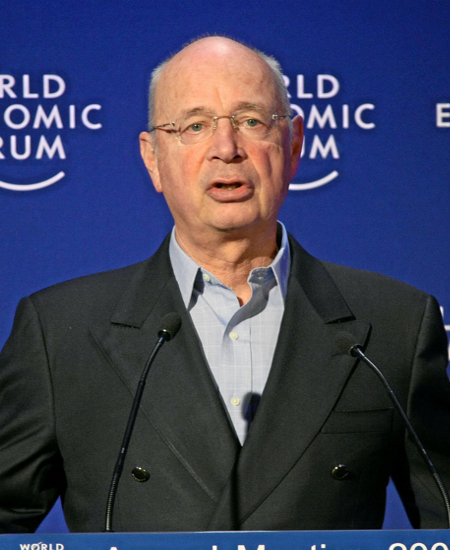Klaus Schwab is an essential figure in the world of innovation and technology. As the founder and chairman of the World Economic Forum, he has dedicated his life to pushing the boundaries of economic thought and shaping the future of the global industry. His role as a pioneer of the fourth industrial revolution makes him an indispensable personality, whose biography reveals the indelible mark he leaves on the modern world.
Table des matières
ToggleAcademic and Professional Background

Klaus Schwab, born on March 30, 1938, in Ravensburg, Germany, is recognized as one of the leading forces of the fourth industrial revolution. Founder and executive chairman of the World Economic Forum (WEF), he transformed this event into an essential global gathering for political, economic, and social leaders.
A graduate in engineering from the Swiss Federal Institute of Technology Zurich (ETH Zurich), Klaus Schwab also holds a Ph.D. in economics from the University of Fribourg and a master’s degree in public administration from Harvard University’s Kennedy School of Government. These solid academic foundations provided him with the knowledge necessary to effectively navigate the realms of technology and the global economy.
In 1971, he founded the European Management Forum, which later became the World Economic Forum. This organization quickly established itself as an essential platform for international collaboration. Schwab highlighted the importance of technological innovation and new business models, thus anticipating the challenges and opportunities of the fourth industrial revolution.
Among his many contributions, Schwab has written several influential books, including “The Fourth Industrial Revolution.” This work explores how emerging technologies, such as artificial intelligence and the Internet of Things, are transforming economic and social systems at an unprecedented pace.
Klaus Schwab has received numerous honors for his work, including the title of Knight of the National Order of the Legion of Honour in France and the Grand Cross of the National Order of Merit in Germany. These distinctions underscore his significant impact in promoting international cooperation and technological innovation.
In addition to his achievements, Schwab is admired for his ability to project into the future and understand the implications of cutting-edge technologies. His visionary leadership continues to inspire leaders around the world to harness the benefits of the fourth industrial revolution for the common good.
Education and Early Career
Klaus Schwab, a prominent German economist, stands as one of the foremost visionaries of our time. Known for conceptualizing and popularizing the notion of the fourth industrial revolution, Schwab has demonstrated great foresight regarding contemporary technological and societal transformations. His influence extends well beyond academic borders, touching various sectors and impacting millions of lives.
Klaus Schwab was born in 1938 in Ravensburg, Germany. From a young age, the pursuit of knowledge and excellence has continually guided his steps. He began his academic journey at the University of Zurich, where he obtained a Ph.D. in economics. His insatiable appetite for knowledge also led him to study at Harvard University, further strengthening his expertise in public administration within the prestigious Kennedy School of Government.
His professional career began in world-renowned institutions. Initially serving as an advisor on economic and industrial policy to various European governments, he later founded the World Economic Forum in 1971. This forum, now an essential platform, gathers political, economic, and academic leaders each year to debate crucial issues impacting our world.
His work spans several decades and is characterized by a holistic and interdisciplinary approach. Schwab is also the author of several influential works, among which “The Fourth Industrial Revolution” holds a central place. In this book, he unpacks the impacts of technological advancements such as AI, cloud computing, and IoT (Internet of Things) on our societies.
- Ph.D. in Economics from the University of Zurich
- Training in Public Administration at Harvard’s Kennedy School of Government
- Founder and chairman of the World Economic Forum
- Author of “The Fourth Industrial Revolution” and other major works
Through his writings and initiatives, Klaus Schwab demonstrates a unique ability to anticipate and shape the evolution of economic and social models. His role in promoting technological innovation and his vision of an interconnected world continue to exert considerable influence on the leaders of tomorrow.
Creation of the World Economic Forum
Klaus Schwab is a key name in the world of the global economy and technological innovation. He is known for founding the World Economic Forum, a place where leaders from around the world gather to discuss the major economic and social issues of our time.
Klaus Schwab was born in Germany, where he began his academic journey studying mechanical engineering at the Swiss Federal Institute of Technology Zurich. He later obtained a Ph.D. in economics from the University of Fribourg and a master’s degree in public administration from the John F. Kennedy School of Government at Harvard.
His professional background is equally impressive. Before creating the World Economic Forum, Schwab worked as a professor of industrial policy at the University of Geneva. He also held various leadership positions in the private sector, notably as an economic advisor for several renowned companies.
In 1971, Klaus Schwab founded the World Economic Forum, initially known as the “European Management Forum.” The idea was to create a space where economic and political leaders could meet and exchange ideas freely.
The Forum quickly gained recognition and became a non-profit international organization. It plays a crucial role in facilitating discussions on topics such as:
- Globalization
- Technology and innovation
- Sustainable development
- Economic disparities
Thanks to his visionary leadership, Klaus Schwab has made the World Economic Forum an unmissable event and an influential platform for international cooperation. He continues to play an active role within the organization, encouraging the adoption of innovative solutions to global challenges.
- Name: Klaus Schwab
- Age: 83 years old
- Nationality: German
- Education: Ph.D. in Economics from the University of Fribourg (Switzerland)
- Career: Founder and chairman of the World Economic Forum (WEF)
- Technological Advancement: Pioneer of the fourth industrial revolution
Contributions to Economic Thought

Klaus Schwab, founder and executive chairman of the World Economic Forum, is widely recognized for his contributions to modern economic thought and his role in promoting the fourth industrial revolution.
Born in 1938 in Germany, Schwab developed a strong interest in economics and technology from an early age. Graduating in engineering and holding a Ph.D. in economics, he has been able to combine these two fields to propose innovative and interconnected perspectives.
Schwab is primarily known for conceptualizing the notion of the fourth industrial revolution. This term refers to the advent of new technologies such as artificial intelligence, robotics, the Internet of Things, and biotechnology. He believes that these innovations have the potential to radically transform economic and social models.
Over the decades, Schwab has published several influential works and articles that explore the impact of emerging technologies on the global economy. Among his notable works are:
- “The Fourth Industrial Revolution”
- “Stakeholder Capitalism”
- “The Great Reset”
In addition to his theoretical contributions, Schwab has also created global discussion platforms through the World Economic Forum. This annual forum, held in Davos, brings together leaders from around the world to debate current and future economic challenges. Under his leadership, the forum has become a hub of innovation and economic reflection.
Schwab’s ideas have been influenced by his admiration for pioneering figures in the technology and innovation sectors, and by his own exceptional career marked by success. His forward-looking vision continues to encourage economic leaders to integrate cutting-edge technologies into their strategies and adopt more holistic approaches to contemporary issues.
Concepts of the Fourth Industrial Revolution
Klaus Schwab is recognized as a pioneer of the fourth industrial revolution, a concept that transforms our world through technological innovations. Born in 1938 in Germany, he has been deeply engaged in international affairs for several decades.
He studied mechanical engineering at the Swiss Federal Institute of Technology Zurich, earned a Ph.D. in economics from the University of Fribourg and a master’s degree in public administration from Harvard University. His solid academic background prepared him for influential leadership roles in the field of global economics.
In 1971, Schwab founded the World Economic Forum (WEF), a non-profit organization aimed at promoting cooperation between the public and private sectors. Today, the WEF is a globally renowned platform for industry leaders, politicians, and academics who gather annually in Davos, Switzerland, to address global challenges.
Schwab introduced the concept of the fourth industrial revolution in 2016, describing a fusion of technologies that blur the lines between the physical, digital, and biological spheres. According to him, this revolution is characterized by developments such as artificial intelligence, robotics, the Internet of Things, and nanotechnology.
Among his contributions to economic thought, Schwab has advocated for the principles of global governance, emphasizing the importance of increased cooperation between nations and businesses to address global issues. He also highlights concerns related to sustainability and environmental challenges, stressing that new technologies must be used responsibly to create more inclusive and just societies.
- Founder of the World Economic Forum
- Forerunner of the fourth industrial revolution
- Promoter of global governance principles
- Advocate for sustainability and responsible innovation
The concepts of the fourth industrial revolution proposed by Schwab include a radical digital transformation across various sectors, influencing how businesses operate and interact with consumers. He envisions a future where technology is deeply integrated into daily life, enhancing the efficiency of services and improving quality of life.
This vision translates into the rise of smart cities, automated supply chains, and personalized healthcare through big data. Schwab stresses the need to prepare the global workforce for this transition, focusing on retraining and continuous education.
Klaus Schwab continues to influence global discussions on technology and the economy. His vision of the fourth industrial revolution remains an essential reference for understanding and navigating the emerging technological future.
Influence on Global Policies
Klaus Schwab, founder and executive chairman of the World Economic Forum, is an emblematic figure of the fourth industrial revolution. Born in Germany and dedicating his career to the study and promotion of technological innovation, Schwab has played a crucial role in transforming the global economy.
Schwab began his career as a business management professor at the University of Geneva. His forward-thinking vision led him to create the World Economic Forum in 1971. This annual event brings together global leaders, private sector elites, and influential thinkers to discuss upcoming challenges and opportunities.
Schwab’s contributions to economic thought are numerous. He introduced and popularized key concepts such as “stakeholder theory,” which proposes that companies should act in the interest of all stakeholders, not just shareholders. This inclusive approach has reconfigured how businesses view their role and responsibility within society.
Schwab has also been a strong advocate for the adoption of new disruptive technologies such as artificial intelligence, 3D printing, and the Internet of Things. He asserts that these technologies can transform traditional economic models and enhance quality of life on a global scale.
Schwab’s influence on global policies is undeniable. Through the World Economic Forum, he has created a platform where world leaders can collaborate on global initiatives such as climate change, poverty reduction, and gender equality. He has also encouraged dialogue around digital governance and human rights in an increasingly connected world.
Schwab has received numerous accolades for his efforts, including honorary doctorates and awards from world leaders in recognition of his significant impact on business and public policy. His writings, particularly “The Fourth Industrial Revolution,” have become essential references for understanding the challenges and opportunities of our time.
In summary, Klaus Schwab is a pioneer who has reinvented how we envision the economic and technological future. His influence continues to shape the discussions and decisions that affect the global economy and public policies.
Vision and Future Impact
Bruno LE MAIRE et Klaus SCHWAB…
— Juste Milieu (@JusteMilieu3) July 15, 2024
… l'improbable RENCONTRE ? ⛔ https://t.co/aec2wxKGRg
Klaus Schwab is an emblematic figure in the world of technology and the global economy. Founder and executive chairman of the World Economic Forum, Schwab is recognized for his forward-looking reflections on the fourth industrial revolution. His work focuses on integrating emerging technologies such as artificial intelligence and the Internet of Things into contemporary economic models.
Schwab’s career has stood out since its beginnings. Graduating in engineering and economics, he has worked closely with industry leaders to understand the challenges and opportunities posed by technological advancements. His book, “The Fourth Industrial Revolution,” published in 2016, has become an essential reference in the field. In it, he describes how the convergence of various technologies irrevocably changes the way we live, work, and interact.
Schwab has also created several global initiatives aimed at promoting innovation and sustainability. Among them is the Global Shapers Community, an organization that brings together young leaders to communicate and develop solutions to global problems. Under his leadership, the World Economic Forum has become a privileged space for strategic discussions among leaders from governments, businesses, and civil society.
For Schwab, the vision and future impact of the fourth industrial revolution rests on a few key elements:
- Rapid adoption of cutting-edge technologies to improve productivity.
- Continuous education and training to prepare the workforce for technological changes.
- Collaboration between the public and private sectors to maximize the benefits of innovation.
- Increased awareness of the social and environmental impacts of new technologies.
Schwab’s efforts are focused on a future where the benefits of technology are shared equitably and where humanity can leverage technological advancements without compromising core societal values. His influence continues to shape the global debate on the role of technology in our lives.
Forecasts for the Global Economy
Klaus Schwab is one of the most influential minds of our time, thanks to his pivotal role in launching the fourth industrial revolution. Born in Germany in 1938, his academic background is impressive, including a Ph.D. in economics from the University of Fribourg and studies at Harvard as part of the advanced management program.
In 1971, he founded the World Economic Forum (WEF), serving as a global platform that brings together leaders from the public and private sectors to discuss disruptive economic issues. Under his leadership, the WEF has evolved into a respected institution that significantly influences economic policies worldwide.
Schwab’s vision of the fourth industrial revolution focuses on integrating technologies such as artificial intelligence, robotics, and cloud computing into existing economic models. He firmly believes that the merging of these technologies will transform not only businesses but also societies as a whole.
- Adoption of new technologies to improve efficiency
- Transformation of traditional economic models
- Evolution of governance structures
Schwab anticipates profound economic changes in the years to come. He envisions a future global economy that is more inclusive and supported by technology. He recommends greater cooperation between governments and businesses to navigate this transformation smoothly.
He also warns against the challenges associated with this evolution, particularly the need to rethink education and professional training to prepare workers for future jobs. He believes that the focus should be on digital skills and professional flexibility.
In conclusion, Klaus Schwab remains a central figure in the global discussion surrounding technological and economic changes. His ideas and initiatives continue to shape the future of the global economy and society as a whole.
Role of Technology in Society
Klaus Schwab is widely recognized as one of the main architects of the fourth industrial revolution. With a clear vision of the changes that technological innovations can bring, he founded the World Economic Forum (WEF) in 1971.
The concept of the fourth industrial revolution introduced by Schwab explores the profound transformations brought about by technological advancements such as artificial intelligence, robotics, the Internet of Things, and cloud computing. By promoting these ideas, Schwab encourages global leaders to reflect on their adoption and potential impacts.
Schwab’s vision extends to the future impact of these technologies on various sectors of society. He predicts that businesses that master these innovations will be the global leaders of tomorrow. According to him, the integration of technology must be carried out ethically and inclusively to ensure maximum benefit to society as a whole.
For Schwab, technology plays a fundamental role in the evolution of society. In particular, he highlights several crucial aspects:
- The transformation of traditional economic models.
- The development of digital skills necessary for the workforce of tomorrow.
- The importance of sustainability and social responsibility in the adoption of new technologies.
Through his commitment and vision, Klaus Schwab has not only influenced international discussions on technology and innovation, but he has also created an essential platform for dialogue among leaders from all walks of life.





